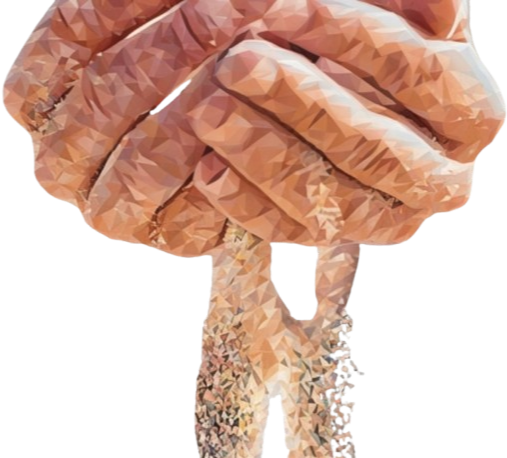
Living with ADHD As a Creative Writer: How ADHD Enhances Creativity And Writing
Written by: Matthew Tegge ©
I was diagnosed with ADHD when I was 35 (literally three months ago at the time of posting). Before that time, I just assumed I had some major flaws in my character. I had trouble focusing, trouble following through with things—I had memory problems, organizational problems, and had a really hard time completing any body of work I set out to finish. I felt like a failure at work, at home, and a failure to my family. When you don’t realize there’s a chemical difference in your brain, it’s easy to believe that you’re simply failing to live up to your potential, and you know you have potential. There are bright, luminous moments of greatness that shine through the darkness of your failures and taunt you with what you could be…if you could only remember how to be it.
Of course, these experiences are my own, and I can’t say with any certainty they’re ubiquitous to the condition but let me list out a few things and we’ll see how much we can all relate.
Procrastination
So, if you’re anything like me, doing a task on time is like pulling teeth. Everything tells you that there are more important things that need to be done right now, or that you have enough time to do it later, why not have some fun right now? Or perhaps you just need to do some more research first, yeah…I’ll look into some things first, THEN I’ll do what I need to do. It’ll only benefit me in the long run. Wait…when was the deadline? S***!
So, what do I do about it? That has been an ever-present struggle, and as I navigate different treatments for ADHD, I’ll find more solutions. For now, I’ve been practicing personal accountability. I find making promises to myself about getting things done by a certain date help me to stay more on track, but more than personal promises, sometimes telling someone else that you’ll do it by a certain time adds a layer of importance that allows you to push through. When I tell my fiancé that I will finish a piece of writing before X time, or X date, it’s not just me failing myself anymore. I love my fiancé, and I never want to fail her, this helps push me forward when otherwise I’d push things off.
Distraction
Do these sound familiar?
“I’m going to sit down as soon as I walk in the door and start working on this blog post I’ve been meaning to write for three days. Oh, Look over there at that bunny, isn’t it cute?”
“Hey, google, how heavy is your average bunny?”
“Hey, google, how many pounds can an eagle carry?”
*2 hours later*
“Hey, google, does chicken taste like anything else? Wait…what was I doing? *Scrolls Facebook until he falls asleep*”
I’m sure you do; I know it is part of my daily life.
What do we do about it? I mean, medication works wonders for sure, but that isn’t the end all be all of treatment and management. One of the biggest words I come across when looking for answers myself is mindfulness, as stated above. The act of being rooted in the moment, and recognizing what you’re feeling, seeing, tasting, smelling. Bringing yourself to the present and realigning your focus to where it should be. When I do this, I often realize that I’ve strayed from the path I’d originally set out for myself and can correct course.
Control Resistance
This one is near and dear to my heart as one of my biggest flaws. This refers to the phenomenon that some people (with or without ADHD) encounter, where regardless of the benefits of a given task, if it feels as though it’s been forced on us or someone is pushing us to do it, we resist. For me, the harder a person pushes, the harder I want to push back, to the point of absurdity more often than not. As I’ve grown older, I’ve been able to identify this and mitigate the impact to some degree, but the inclination is still there. Luckily when I’m at work I can at least mute the response and stay humble, getting done what is required of me by acknowledging that I accepted these situations by taking a job to begin with.
Solutions to this are as varied as the people who experience it. What I find for myself is doing my best to remember when something is truly beneficial, I need to accept it. Whether or not it was someone else’s idea, or that someone is trying to push me to do it, if it’s something I would have wanted to do anyway or would be highly beneficial to me, I do my best to simply shrug the resistance off and do it anyway. This is easier said than done, and if you find a surefire way to fight this inclination, I’d love to hear it.
Finishing Sentences
I’m sure this one is more common among those of us with ADHD, we tend to analyze the course of a person’s story or thought process while they’re still talking. Sometimes we’ll answer a person’s question long before they finish asking it, or we’ll finish the story for them before they reach the end. This translates into all sorts of fun when we start watching movies and television with loved ones, and identify plot points, tropes, and common themes to come up with a pretty accurate overall conclusion. We then proceed to predict the story and ruin it for everyone else in the room.
This is also something that helps strengthen our writing and creative endeavors. We recognize all those tropes and plot points and can often use them creatively or avoid them as necessary when doing our own creative work. To avoid interrupting people to finish their thought or story, that comes down to self regulation which is a weakness for those with ADHD across the board. It takes practice and consideration and that comes with time and effort. An apology never hurts either if you mess up along the way.
Creative Writing With This In Mind
While there are challenges to writing with ADHD, there are also some unique advantages that can make us better writers.
So, let’s start with the good news:
We have the advantage when it comes to making complex and rich plot lines, we are able to get into the heads of our characters and play out different interactions in the same way we figure out what people are saying ahead of time—the same way we know how a movie ends before its halfway finished. When we hyperfocus, we can pump out entire chapters of our novels or get the first draft of a long form article done in a single sitting. We can get things done with minimal loss in quality through tough deadlines because we’ve practiced our entire lives for that very thing, accidentally or otherwise. We’re good at reading people and plotlines and those are two huge advantages for making believable characters in strange environments, a massive strength in any story. There’s nothing worse than a really interesting setting with characters that seem cut from cardboard—and half as deep. So as strange as it seems to be able to build nearly complete people from our imaginations (and ignoring how crazy that can sound), we are extremely fortunate to have the ability to do so.
Now, for the bad news:
It’s REALLY hard to write a book. Like…really, really hard. Especially when your mind wants to jump from idea to idea, and staying on one track feels like trying to drive with the emergency brake on. I’ve been trying to write the same fantasy series for close to a decade and it’s still not finished. Inspiration waxes and wanes like unreliable tides, and we can’t rely on something so intangible to get anything done in an acceptable timeframe. While hyperfocus is an amazing asset, it can also lead to tunnel vision. When I get wrapped up in one task, I can forget to take breaks, neglect other responsibilities, or even lose track of time altogether. But if it can be harnessed, it's a powerful force for productivity. Our neurodivergences provide us with the double-edged sword we can use to cut our path through life, and subsequently lodge it into our own knee if we’re not careful. Yes, ADHD gives us a unique advantage in creating complex characters and plotlines, but it also brings challenges that can slow down our progress significantly. That means, if we're serious about writing and finishing that novel, we need strategies that help us navigate both the chaos and the creativity.
Here are some of my strategies:
Reminders
If you’re working on something that’s bound to take more than a day or two, start hanging up reminders of it for yourself. My office has printed pages of goals, maps, and things related to my fantasy world surrounding my computer. It helps me capitalize on the fact that I’ll get distracted and look away from the screen, just to be reminded of why I’m sitting there. Even when I’m not directly working on my novel, I’m constantly being reminded of its existence and that goes a long way for someone who forgets things often. It also keeps things at the forefront of your mind, and you’ll find over time that having reminders around you can help ideas flow more freely, and more often.
Set Goals
Set daily, weekly, or monthly goals. Set them so they’re realistic, but not too easy. Make yourself feel accomplished when you complete them, but don’t allow yourself to feel like you’ve failed when you can’t. They’re ideals, what you expect of yourself when you’ve hyperfocused and locked in. Just don’t give way to negativity and spiraling. Writing shouldn’t be a negative experience, if you hate the task of writing you might be engaging in the wrong hobby or going about it in a way that doesn’t work for you.
Join a Writing Group
I’ve just started this process and so far, it’s a great help. When I joined my first writing group, I wasn’t sure what to expect. But hearing feedback—both positive and constructive—has given me fresh perspectives on my work. It’s not just about getting praise; it's about learning what works and what doesn’t, which has pushed me to become a stronger writer. Getting feedback from other writers on your work is invaluable whether it’s positive praise or constructive criticism. People generally won’t give something for nothing and will require some sort of quid pro quo, but that’s valuable in itself. Reading the work of another author can give you time to step away and see another style, learn from it, and refresh your mind for your own work when you get back to it. Critiquing someone’s work is also a great way to flex your editorial muscles and critical thinking skills, and you’ll need those often moving forward.
What does it all mean?!
Having ADHD isn’t easy, but I would never go so far as to classify it as a curse. It is a gift when harnessed, one that I’m learning to be grateful for. I might have a brain like a Rubik’s Cube: frustratingly complex and always out of alignment—but it comes with moments of pure color, beautiful patterns, and flashes of insight that could never have been attained another way. Embrace your differences as you compensate for your shortcomings, and you’ll be able to find success through the chaos. Remember that those twists and turns are what make your creativity unique. Lean into the chaos, work with your ADHD rather than against it, and you’ll find that writing can be a journey full of unexpected brilliance.
Write on, my friends—your best work is right around the corner.

0 Comments Add a Comment?